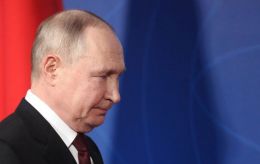South Korea's ruling party head supports President Yoon’s impeachment
 Photo: President of the Republic of Korea Yoon Suk Yeol (Getty Images)
Photo: President of the Republic of Korea Yoon Suk Yeol (Getty Images)
The leader of South Korea's ruling party expressed support for suspending the constitutional powers of President Yoon Suk Yeol after he declared martial law earlier this week. This unexpected turn of events makes the president's impeachment more likely, reports the Associated Press (AP).
Opposition parties insist on holding a parliamentary vote on impeachment on Saturday, calling Yoon's brief declaration of martial law "unconstitutional, illegal rebellion or coup." However, they need support from some members of the presidential party, People Power, to secure a two-thirds majority required to pass the impeachment motion.
During a party meeting on December 6, the ruling People Power Party leader, Han Dong-hun, emphasized the need to suspend Yoon's presidential duties and powers as soon as possible. He argued that the current president poses a "significant risk of extreme actions, like reattempting to impose martial law, which could potentially put the Republic of Korea and its citizens in great danger."
Han stated that he had received intelligence indicating that Yoon had ordered the commander of the country's military counterintelligence to arrest and detain key political figures on charges of anti-state activities during the martial law period.
“It’s my judgment that an immediate suspension of President Yoon Suk Yeol’s official duties is necessary to protect the Republic of Korea and its people,” Han said.
What is needed for impeachment
Impeaching Yoon would require the support of 200 out of 300 members of the National Assembly (South Korea's parliament). Opposition parties, which jointly proposed the impeachment, hold 192 seats in the parliament. The People Power Party has 108 members.
If impeachment is approved, Yoon would be removed from office pending a decision by the Constitutional Court on whether to dismiss him or restore his presidential powers. The prime minister, Han Duck-soo, would assume presidential duties in the interim.
At a closed briefing for lawmakers, the first deputy director of South Korea's National Intelligence Service, Hong Jang-won, stated that Yoon called him after declaring martial law and ordered him to assist the counterintelligence unit in detaining key political figures.
According to Kim Byung-kee, one of the lawmakers present at the meeting, those figures included Han, opposition leader Lee Jae-myung, and National Assembly Speaker Woo Won Shik. Kim said that Hong had told lawmakers that he had ignored Yoon's orders.
At the same time, the head of the intelligence agency, Cho Taeyong, questioned Hong's testimony. Cho told reporters that such an order would have been issued to him, not to Hong, and that he had never received any instructions from Yoon to detain politicians.
Earlier, Han stated that he would work to block the impeachment proposal, even though he criticized Yoon’s declaration of martial law as unconstitutional. Han emphasized the need to "prevent damage to citizens and supporters caused by unprepared chaos."
Active investigation
Vice Defense Minister Kim Seon Ho promised active cooperation from the ministry with the prosecution in investigating the military's role in Yoon's imposition of martial law. He said that military prosecutors would also be involved in the investigation. He denied media reports suggesting that Yoon and his military allies might reconsider declaring martial law.
“Even if there’s a demand to enforce martial law, the Defense Ministry and the Joint Chiefs of Staff will absolutely not accept it,” Kim said.
Opposition parties and Han claim that Kim Yong Hyun recommended that Yoon declare martial law. During parliamentary hearings on Thursday, Kim Seon Ho said that Kim Yong Hyun also ordered troops to be deployed to the National Assembly after Yoon declared martial law.
Kim was appointed acting defense minister after Yoon's office accepted the resignation of Defense Minister Kim Yong Hyun on Thursday. Kim Yong Hyun has also been banned from traveling while under investigation for his role in the martial law declaration.
The leader of the main liberal opposition Democratic Party, Lee Jae-myung, said in a television address on Friday that it was crucial to remove Yoon from office as soon as possible.
Lee called Yoon's declaration of martial law a "rebellion and also a self-coup." He argued that Yoon’s actions seriously damaged the country's image and paralyzed its foreign policy, citing criticism from the Biden administration and the cancellation of foreign leaders' visits to South Korea.
South Korean Prosecutor General Shim Woo Jung told reporters that the prosecution plans to investigate charges of treason against Yoon following complaints filed by the opposition. Although the president is generally immune from prosecution while in office, this protection does not extend to accusations of treason or rebellion.
Martial law and political crisis in South Korea
On the evening of December 3, President Yoon Suk Yeol unexpectedly declared martial law in South Korea. He accused the Democratic Party of ties to North Korea and anti-state activities.
The decision significantly destabilized the political situation, leading to clashes between civilians and military personnel near the South Korean parliament in Seoul. Around a dozen officials resigned in protest of the decision.
The unrest triggered by Yoon's martial law decree raised concerns among neighboring countries, particularly democratic Japan and the United States — South Korea's main ally. This is because one of Asia's strongest democracies is facing a political crisis that could lead to the resignation of its leader.
A few hours after the controversial decision, South Korea's parliament approved a resolution calling for the immediate repeal of martial law. The country's government also passed a similar resolution.
On the evening of December 4, Yoon Suk Yeol lifted martial law, which had been in effect for over six hours.
The police are investigating the president and several officials.
On Saturday, December 7, parliament will consider impeachment proceedings against the president.

